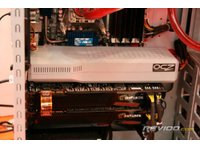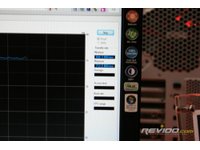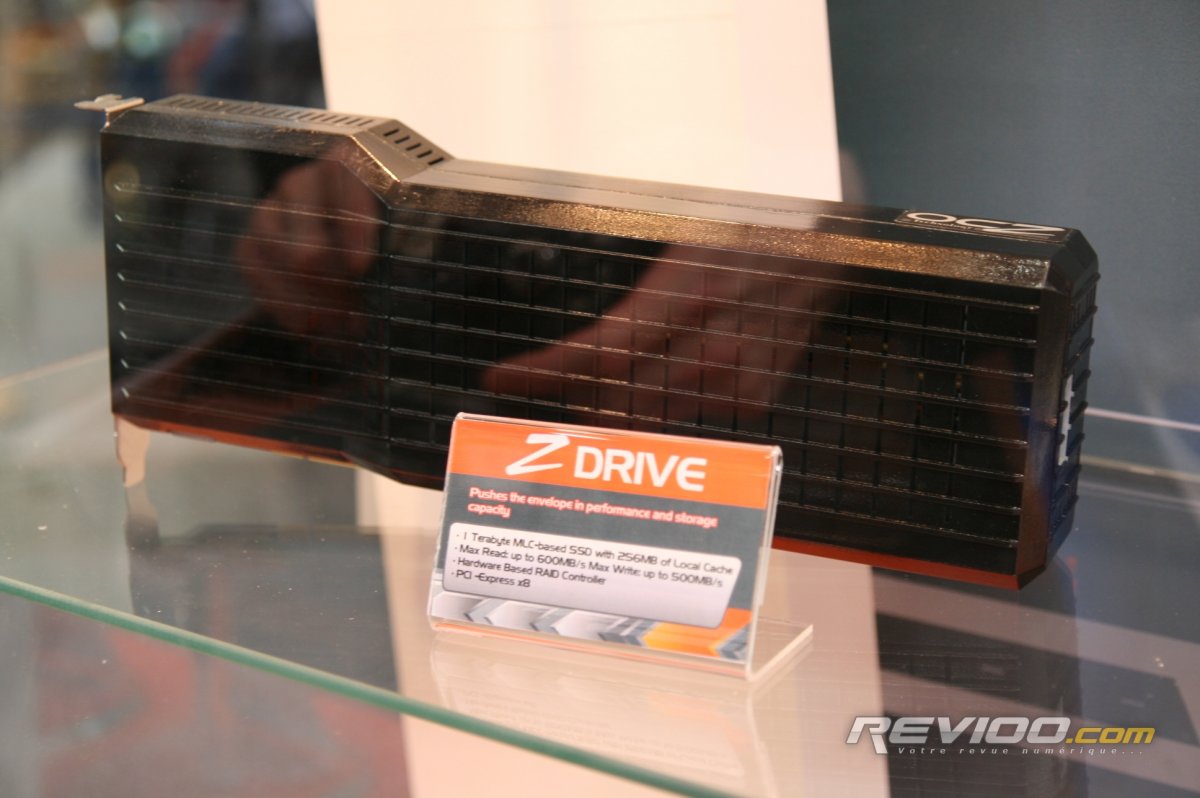OCZ's New Blazing Fast 1TB Z SSD Drive
OCZ was demonstrating its new Z Drive with 1 TB of storage at CeBIT 2009 this week.
The new Z Drive from OCZ is a storage device that connects to an x8 PCIe slot and offers 1 terabyte of storage capacity. The Z Drive is about the same size a dual-slot graphics card, so its not exactly small, but the device is stated to offer maximum read and write speeds of up to 600 MB/sec. and 500 MB/sec., respectively. According to the demo OCZ had on display at CeBIT though, the Z Drive was actually showing minimum and maximum read speeds of 654 MB/sec. and 712 MB/sec., respectively. Incredible.
In a lot of ways, OCZ's new Z Drive appears similar to Fusion-io's ioDrive, both of which connect to a PCIe slot and offer seemingly similar transfer speeds. Unlike the smaller ioDrive however, the new Z Drive is apparently comprised of just four 256 GB MLC-based SSDs in RAID 0. The Z Drive also features a hardware-based RAID controller and 256 MB of local cache. Lets hope the use of local cache did not unfairly inflate the results we are seeing though, as previous reviews of four Intel X-25E SSDs in RAID 0 showed transfer speeds only hitting as high as 366 MB/sec.
As expected, the new OCZ Z Drive will not be cheap. According to Revioo.com, $1500 is the expected price, but that is still less than the cost of an 80 GB Fusion-io's ioDrive and possibly less than a do-it-yourself solution. No word yet on availability, but the Z Drive being demoed at CeBIT was apparently a fully functioning prototype.


All photos credit of Revioo.com
Get Tom's Hardware's best news and in-depth reviews, straight to your inbox.
-
cctchristensen Great news. I remember a few years ago when I was reading about FusionIO and thinking, "wouldn't it be nice if this is the future of hard drives?" Glad to see that actually come to fruition.Reply -
The Schnoz Gian124I just wish these PCI-based drives were bootableAll in due time. Are you listening Microsoft and motherboard manufacturers.Reply
BTW, computer geniuses out there. Since I'm too lazy to do the math how about you do it for me. What PCI Express port would be minimal to get the full bandwidth this card needs. Would PCI Express x1 or x4 be enough, or would you actually need x8 like the article suggests? -
Harby My thoughts exactly. If I ever get an SSD it'll be the OS host disk, not a storage medium. Thus no boot = no thanks for me.Reply
But apparently PCI-E based drives will become very popular so its matter of time for OS's and mobos to support booting from them.
Seriously, who would have though a couple of years ago that we'd have drives connecting directly to a PCI-E interface. -
cryogenic The SchnozAll in due time. Are you listening Microsoft and motherboard manufacturers. BTW, computer geniuses out there. Since I'm too lazy to do the math how about you do it for me. What PCI Express port would be minimal to get the full bandwidth this card needs. Would PCI Express x1 or x4 be enough, or would you actually need x8 like the article suggests?Reply
Since you called for a genius (and I am one: because I googled "pcie speed" and got the required info from first result). Here it's how it stands:
Transfer rates per lane (1x pcie):
1.x 2.5 GT/s 250 MB/s
2.0 5 GT/s 500 MB/s
3.0 8 GT/s 1 GB/s
so for pcie version 1.x and 1 lane (1x) the speed is 250 MB/s, for 4x (4 lanes) is 1GB/s.
The answer for pcie 1.x and 2.0 a 4x expansion slot is needed, for pcie 3.0 (not released) even a 1x slot would suffice.
-
Gian124 jonathan1683Why cant we boot from them? Raid cards are bootable in pci slots....Reply
I don't know the specifics, I just recall reading an article on the Fusion-io drive here stating:
"As already mentioned, the card is a storage device, but it’s not a fully-featured drive and you cannot boot from it."
http://www.tomshardware.com/reviews/fusioinio-iodrive-flash,2140-2.html
some of the gurus here may be able to explain it better...
but it would be nice to have this kind of access time, read/write time, and interface bandwidth in a bootable drive.
Then again, it would also be nice for manufacturers and programmers to switch from binary to a tertiary language in order to increase performance based on a +5v, 0v and -5v signal
some things are embraced by industry, others are avoided for various reasons. -
ShadowFlash I would think that booting from this would be likely considering it is its own RAID controller with cache. It would be nice if there were a battery backup available. It does seem a shame to waste double wide PCI-E slots instead of a single controller with a 5.25" drive bay option. Unlike the IO drive, this really is just a normal controller ( perhaps optimized for SSD ) with SSD drives mounted to it and fancy packaging. Pretty cool all-in-one solution none-the-less.Reply -
Belardo And considering the OLD days when PCs and most computers in the 80~90s didn't have on-board hard-drive controllers. We used to use 8bit ISA cards to connect IDE drives and those booted.Reply
Modifed Commodore 64/128s can boot and load data from HDs and CD drives! These things were made in 1980~1990!
So making a bootable drive with PCIe should be some-what easy. Such as the BIOS option "boot other" device... like SCSI, RAID or IDE/SATA controllers.
I wouldn't mind seeing 500GB version for $200~300. ;)
Give it 2-3 years, that 1TB SSD drive will be 1/4 the size and at least 1/4~1/8 the price.
-
tenor77 BelardoAnd considering the OLD days when PCs and most computers in the 80~90s didn't have on-board hard-drive controllers. We used to use 8bit ISA cards to connect IDE drives and those booted.Modifed Commodore 64/128s can boot and load data from HDs and CD drives! These things were made in 1980~1990!So making a bootable drive with PCIe should be some-what easy. Such as the BIOS option "boot other" device... like SCSI, RAID or IDE/SATA controllers.I wouldn't mind seeing 500GB version for $200~300. Give it 2-3 years, that 1TB SSD drive will be 1/4 the size and at least 1/4~1/8 the price.Reply
Ahh those were the days. Anyway I have to agree with you that this should be a BIOS issue. The storage medium should have no bearing on loading up the data. If it provides 1's and 0's it should work with the proper BIOS.
